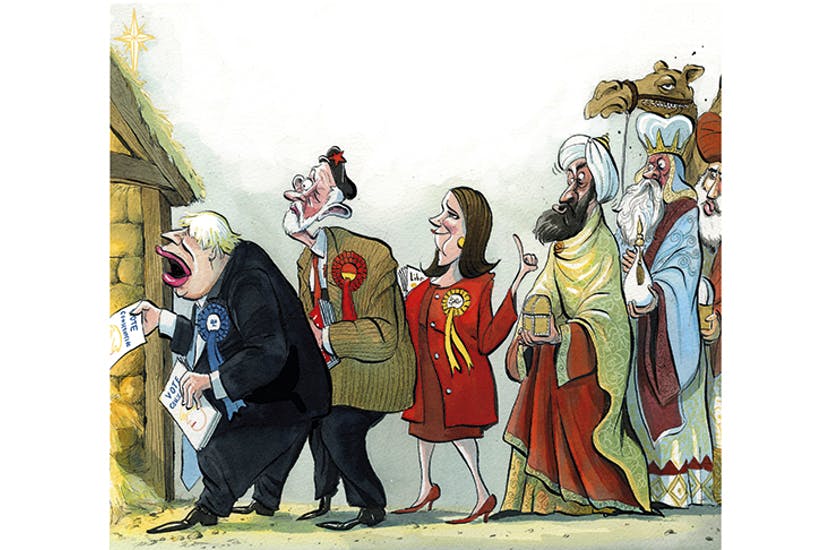This general election isn’t the most important in a generation, it is the most significant in the lifetime of anyone born since 1945. It will decide whether Brexit happens, whether Britain has the most left-wing prime minister in its history, whether the Scottish Nationalists are able to secure a second independence referendum and whether Britain’s two–party system can survive.
Boris Johnson has taken a risk. A winter poll at a time of unprecedented electoral volatility is dangerous and he has no safety net. The Tories have to win outright to govern: they have no potential partners anymore. The Liberal Democrats’ position on Brexit is irreconcilable with the Tory one; the DUP won’t be doing another deal with them any time soon. If Boris Johnson wins the most votes and the most seats but not a majority, he’ll still lose office. It is all or nothing for him.
But there were no better options for the Prime Minister. The alternative to this election was trying to pilot his Brexit deal through the Commons without a majority, having been defeated already on the timetable. His loss on the Brexit programme motion last week was a clear indication that he could not have got a clean bill through the Commons. If he had persisted down this route, he would have been left with the unappetising choice of either pulling the bill or accepting amendments that were designed to undercut the changes he had secured.
Even the most optimistic of Tories think that they will lose some seats to the SNP in Scotland and some to the Liberal Democrats in England. Given that they didn’t win a majority last time, and need one this time, it means the Tories are relying on winning a double-digit number of seats from Labour. As one cabinet minister puts it: ‘We know the Lib Dems and the SNP will do better. So we are risking everything on Labour collapsing.’
This was, of course, the bet that the Tories made in 2017 — and we all know how that turned out. But there are reasons to think this time will be different. One of the Tories’ big problems in 2017 was that their victory was treated as inevitable. Voters who hadn’t backed the Tories before felt they were being asked to provide the party not just with the ability to push Brexit through but with a blank cheque. It was why Theresa May’s suggestion that she would like a free vote on bringing back fox hunting prompted such a reaction.
Boris Johnson has a reason for calling an election. Theresa May did not
After the election, Lynton Crosby — who had returned to run the campaign — complained that with so many voters certain of what the result would be, it was nigh-on impossible to land any warnings about the dangers of a hung parliament or a Jeremy Corbyn government. This time, voters will be left with the impression that nothing is certain. If they want something to happen, they’ll have to vote for it.
The Tories can use this to their advantage. I am told that when Isaac Levido, the Australian hired to run the election, presented to the party board on Monday, he showed them evidence that half of voters want the Tories to be in government in some form, whether that be with a majority or in coalition. For Labour, the number is much lower: just over one in four want Labour to be part of the government. The polling suggests that the Tories must make voters see this election as being about who they want as prime minister.
Tellingly, the Tories are keen on head-to-head TV debates between Boris Johnson and Jeremy Corbyn. By contrast, Johnson will not participate in the seven-way debates among all the party leaders; that job will be left to a senior cabinet minister.
The poll results imply that Labour will find it hard to activate tactical voting in its favour because nearly everyone who wants the party in government is planning to vote for it already. And asking someone who doesn’t want Labour in government to tactically vote for the Labour candidate is a hard ask.
Another challenge to those seeking to organise tactical voting is the power struggle going on within the campaign for a second referendum, the People’s Vote, which Rod Liddle discusses. There have been staff walkouts and people attending meetings flanked by security guards. The People’s Vote is the most obvious vehicle for organising Remain tactical voting, but its leadership has proved itself vain and divisive. This is a blow to the Remain cause.
Boris Johnson has a reason for calling an election; Theresa May did not. This is one of the most significant differences between 2017 and 2019. May suddenly announced that she needed an election to stop the opposition parties and the House of Lords from obstructing Brexit. But in April 2017 when May decided to go to the country, parliament had done little to impede Brexit. Indeed, it had passed the bill giving the government the right to trigger Article 50 un-amended and by more than 350 votes.
By contrast, it’s clear now to the country that parliament has repeatedly thwarted and obstructed Brexit since the previous election and during Boris’s tenure as Prime Minister. He will have to explain why after parliament voted for his deal in principle but not the timetable for approving it, he decided to go for an election. But persuading Leave supporters that this parliament was hoping to soften or delay Brexit should not be too difficult.
The Tories have learnt the lesson of 2017. Their manifesto won’t frighten the horses — it will seek to blunt Labour’s attacks by promising more resources for the NHS, the police and education.
In 2017, Corbyn had a remarkably successful campaign. His own personal rating improved by 30 points during the campaign, according to Ipsos-Mori. But since then, his numbers have plummeted — and are now far worse than they were before that election was called.
On polling day in 2017, May and Corbyn were tied on the YouGov question of who would make the best prime minister. Right now, Boris Johnson has a 23-point lead on this measure. Given that, unlike May, Johnson enjoys campaigning and is a known quantity to voters, it is hard to imagine his numbers shifting that dramatically during the campaign. The Brexit party will be hoping that his failure to meet his ‘do or die’ 31 October deadline will hurt him with Leave voters. There is not much sign of that yet, though. As for Corbyn, as the former Australian prime minister Paul Keating once asked, ‘Can a soufflé rise twice?’
Boris Johnson’s strongest message may well be: ‘Vote for me and it will be over by Christmas.’ A Tory majority will break the deadlock and the UK will leave the EU with a deal in an orderly fashion, though of course Brexit will not be finished once the withdrawal agreement is passed: there will then follow the trade negotiations with the EU. But these will be less traumatic than the question of whether the UK should leave or not.
The Liberal Democrats will have their own version of this argument: repeal Article 50 and pretend that the past few years were just a bad dream. But this pitch has a credibility problem. It relies on the Lib Dems winning a majority (an unlikely event), and Leavers simply forgetting that they won the referendum in 2016. Labour, by contrast, is committed to another negotiation and a referendum, which would mean 2020 would be even more dominated by Brexit than this year has been.
Any election is a risk and this is especially true in such a febrile time. But 2019’s election may well reverse the Tory errors of 2017.
SPECTATOR.CO.UK/RADIO
Will Tanner and Stephen Bush on the upcoming election.







Comments